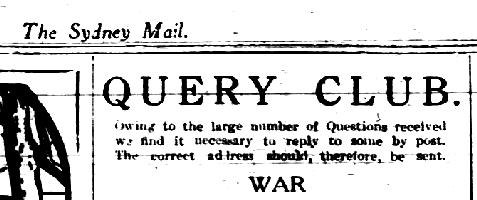Topic: Gen - Query Club
The Query Club
17 March 1915

The large scale of the Great War often gave people a sense of alienation from the activities of the government and the army. To overcome this, newspapers of the day commenced columns called Query Club or similar names, where ordinary people could clarify their understanding of the complex processes. They also provide us, the historians, an insight into witnessing first hand, the responses of the various bodies to public concerns. The end product is a window into a society now almost out of living memory.
This is the Query Club from the Sydney Mail, 17 March 1915, p. 26.
EMPLOYEES ON ACTIVE SERVICE
"Defence"
It is understood that the company you mention is keeping open the positions of those of its employees who have gone on active service.
UNIFORMS FOR RIFLEMEN
"R.B." asks if the military authorities will supply uniforms to members of rifle clubs.
No; the question of uniforms has frequently been raised; but, if the clubs decide to adopt them, it is probable that they will have to bear the expense themselves. The authorities might give a subsidy, but it is not likely.
LORD KITCHENER
"Wymum" (Wymum South) asks where Lord Kitchener was born, and what is his surname.
Lord Kitchener's surname is the same as his title. His full name is Horatio H. Kitchener. Though he was born at Crotton House, Ballylongford, Couthy Kerry, Ireland, he is of direct English stock, his father being the late Lieutenant Colonel H.H. Kitchener, of Leicestershire.
JAPANESE AND UNITED STATES NAVIES
"Katoomba" (N.S.W.)
Is informed that the Japanese fleet in the Pacific is much stronger than that of the United States. The Japanese fleet in the Pacific at the end of last June comprised four Dreadnought battleships, one battleship cruiser, 10 pre-Dreadnought battleships, 10 cruisers, 75 destroyers, and 15 submarines. Since then it has been substantially added to. The United States fleet in the Pacific at the same time was one battleship, 12 cruisers, 14 destroyers, 10 light cruisers, and 14 submarines. Feverish activity in the United States shipbuilding yards has, however, been maintained since the war broke out. The utmost secrecy as to the relative strength of the various navies has prevailed for some time.
LIFT ATTENDANT
"A.E.T." (Leichhardt) asks how and where he can obtain a certificate for a lift attendant.
At the office of the Superintendent of Lifts and Scaffolds, Public Works Department, Sydney. Applicants must prove their ability to manage a lift and replace fuses that blow out. They must also be of good character.
Further Reading:
Citation: Query Club, 17 March 1915



